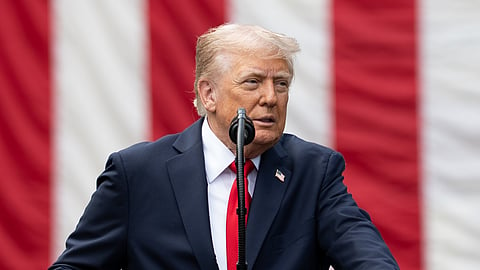

U.S. President Donald Trump has announced that a deal has been reached with China to maintain TikTok's operations in the United States.
The agreement comes after weekend trade negotiations in Madrid, where officials from both nations established a framework for the social media platform's ownership.
Trump stated to reporters as he departed the White House for a state visit to the UK:
We have a deal on TikTok, I've reached a deal with China, I'm going to speak to President Xi on Friday to confirm everything up.
The platform, owned by Chinese firm ByteDance, faced a potential ban unless it divested its U.S. operations due to national security worries over data sharing.
Trump has extended the ban deadline multiple times since its initial announcement in January, with the latest extension set to expire on September 17.
U.S. Treasury Secretary Scott Bessent confirmed the framework agreement following the fourth round of trade discussions between the world's largest economies.
Bessent noted that Trump and Chinese President Xi Jinping are scheduled to discuss finalizing the deal on Friday, aiming to transition ownership to U.S. entities.
He emphasized, “We are not going to talk about the commercial terms of the deal. It’s between two private parties. But the commercial terms have been agreed upon.”
China's international trade representative Li Chenggang described the outcome as a “basic framework consensus” to resolve TikTok issues cooperatively while reducing investment barriers.
The deal reportedly involves a mix of current and new investors, with completion expected within 30 to 45 days, and U.S. tech firm Oracle retaining its role in hosting TikTok's U.S. servers.
U.S. Trade Representative Jamieson Greer highlighted the focus on ensuring fairness for China alongside protecting American national security interests.
Wang Jingtao, deputy head of China's cyberspace administration, indicated consensus on licensing intellectual property like the algorithm and entrusting a partner with U.S. user data security.
Despite progress on TikTok, broader issues such as export controls, Chinese investments in the U.S., and restrictions on fentanyl-related chemicals remain unresolved.
Bessent pointed to strong agreement on combating money laundering tied to drug trafficking.
Chinese Vice Premier He Lifeng characterized the talks as “candid, in-depth and constructive,” per China's Xinhua news agency.
Li Chenggang criticized U.S. practices, stating:
The U.S. side should not on one hand ask China to accommodate its concerns, whilst at the same time continue to suppress Chinese companies.
A fifth round of negotiations is anticipated soon, potentially leading to a Trump-Xi summit later this year or early next.
Analysts suggest the Asia-Pacific Economic Cooperation meeting in South Korea at the end of October could facilitate such a leaders' encounter.
Wendy Cutler, senior vice president at the Asia Society Policy Institute, observed that the deal represents “an important step forward in resolving a lingering bilateral dispute.”
ByteDance has maintained that its U.S. operations are separate and no data is shared with the Chinese government, resisting a full sale.
The U.S. Justice Department views TikTok as posing a significant national security threat due to its access to American user data.
This framework aims to address these concerns while averting a shutdown, with a buyer announcement expected shortly.